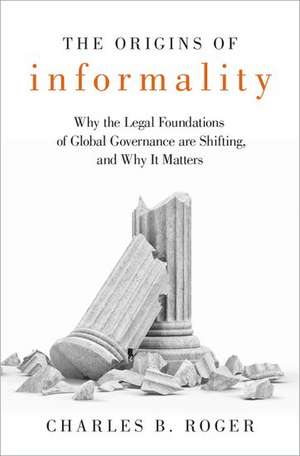The Origins of Informality: Why the Legal Foundations of Global Governance are Shifting, and Why It Matters
Autor Charles B. Rogeren Limba Engleză Hardback – 9 apr 2020
Preț: 510.75 lei
Preț vechi: 587.29 lei
-13% Nou
Puncte Express: 766
Preț estimativ în valută:
97.75€ • 101.67$ • 80.69£
97.75€ • 101.67$ • 80.69£
Carte disponibilă
Livrare economică 11-17 martie
Preluare comenzi: 021 569.72.76
Specificații
ISBN-13: 9780190947965
ISBN-10: 0190947969
Pagini: 288
Dimensiuni: 239 x 155 x 31 mm
Greutate: 0.52 kg
Editura: Oxford University Press
Colecția OUP USA
Locul publicării:New York, United States
ISBN-10: 0190947969
Pagini: 288
Dimensiuni: 239 x 155 x 31 mm
Greutate: 0.52 kg
Editura: Oxford University Press
Colecția OUP USA
Locul publicării:New York, United States
Recenzii
...a novel and insightful account of informality in international cooperation...The book is certain to inform and inspire subsequent research on the formation and evolution of international organizations.
This book is extraordinarily well put together. Its theoretical framework builds upon prior informal IO [international organization] scholarship to articulate an alternative theory to informal IO creation. Its unique data set of informal IOs, its thorough and transparent quantitative analysis, and its cohesive integration of archival research and historical analysis across six case studies will substantially advance scholarship.
Charles Roger shows that the number and proportion of informal international organizations have increased rapidly recently, and provides strong evidence for an innovative explanation focusing on the autonomy of regulatory agencies and increases in domestic constraints. The Origins of Informality is an important book
Informal international organizations have grown in number and prominence in recent decades, from G20 summits to regulatory forums and climate change clubs. Charles Roger provides the most comprehensive investigation to date of this important sector of global governance, explaining why states create these organizations and evaluating their contribution to the effectiveness and accountabiliy of global collective action
This impressive volume advances a theory of informal governance that places domestic politics at its center. Aside from developing a compelling theory, Roger introduces one of the first systematic measures of informal governance, and hereby contributes to a broad effort in IR to put the study of global governance on a sound empirical footing. The Origins of Informality is essential reading for anyone concerned with the future of global governance
This book is extraordinarily well put together. Its theoretical framework builds upon prior informal IO [international organization] scholarship to articulate an alternative theory to informal IO creation. Its unique data set of informal IOs, its thorough and transparent quantitative analysis, and its cohesive integration of archival research and historical analysis across six case studies will substantially advance scholarship.
Charles Roger shows that the number and proportion of informal international organizations have increased rapidly recently, and provides strong evidence for an innovative explanation focusing on the autonomy of regulatory agencies and increases in domestic constraints. The Origins of Informality is an important book
Informal international organizations have grown in number and prominence in recent decades, from G20 summits to regulatory forums and climate change clubs. Charles Roger provides the most comprehensive investigation to date of this important sector of global governance, explaining why states create these organizations and evaluating their contribution to the effectiveness and accountabiliy of global collective action
This impressive volume advances a theory of informal governance that places domestic politics at its center. Aside from developing a compelling theory, Roger introduces one of the first systematic measures of informal governance, and hereby contributes to a broad effort in IR to put the study of global governance on a sound empirical footing. The Origins of Informality is essential reading for anyone concerned with the future of global governance
Notă biografică
Charles B. Roger is an Assistant Professor at the Institut Barcelona d'Estudis Internacionals (IBEI). His research explores the transformations occurring in our system of global governance and how these are shaping--for better or worse--our ability to address cross-border problems. Roger's research has been published in journals such as Global Policy, International Interactions, International Studies Quarterly, International Studies Review, and the Review of International Organizations. His recent books include The Comparative Politics of Transnational Climate Governance (with Liliana Andonova and Thomas Hale) and Transnational Climate Change Governance (with Harriet Bulkeley et al.).
